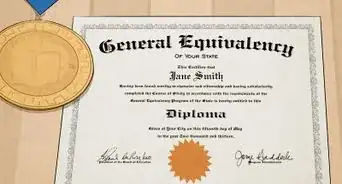This article was co-authored by Susan Pazak, PhD. Dr. Susan Pazak is a Licensed Clinical Psychologist & Professional Life Coach. With more than 21 years of experience, she specializes in treating adolescents and adults with psychological issues using cognitive behavioral therapy, symptom reduction skills, and behavior modification techniques. She has been featured in numerous media outlets and shows, including “My Strange Addiction". Dr. Pazak holds a BA in Psychology with a minor in Communications from The University of Pittsburgh, an MA in Clinical Psychology from Pepperdine University, and a PhD in Clinical Psychology from Alliant International University.
This article has been viewed 18,415 times.
Your relationship with your parents will likely change as you reach adulthood. For example, your parents may start sharing new types of information with you, or they may keep secrets in an attempt to protect you. In order to deal with your parents keeping secrets, you should have an open and honest conversation with your parents about secrets. Talk about what type of information needs to be shared as they age. If you discover that your parents have been keeping a secret from you, try not to take it personally and come up with strategies to move on in your relationship.
Steps
Talking with Your Parents about Secrets
-
1Choose an appropriate time to talk. If you want to have a serious conversation with your parents about keeping secrets, you should broach the topic when your parents are not busy. It would be difficult to have an important and meaningful conversation when your parents are preoccupied with another task.[1]
- For example, ask your parents to go on a walk or go for a car ride. This will allow you to have their undivided attention and will give you an opportunity to talk with them about your feelings.
-
2State your intentions. A good way to begin a tough conversation with your parents is by being straightforward and communicating what it is that you want from the conversation. You could begin by saying "Mom and dad, I have something that I want to get off my chest and I need you to listen to me." This communicates to your parents that you want them to pay attention to what you are about to say.[2]
- You could also say, "I need to ask you a question and I am looking for some advice on how we can handle this situation better if it arises again in the future."
- This way you are communicating to your parents that you value their opinions and want to come to an agreeable solution.
Advertisement -
3Ask why they kept the secret from you. Once you have a clear mind, you can approach your parents and ask them why they chose to keep a secret from you. For example, they may have been protecting you or maybe they were worried about how you would react to the news.[3]
- If your parents give you feedback that they kept something from you because they were worried about how you might react, try to be receptive to this constructive criticism.[4] Being willing to listen to what they have to say can help to improve your relationship and the flow of your communication.
- Think back on previous times when your parents have confided in you and ask yourself: “Did I keep the secret?” “Was I judgmental about things they told me?”
-
4Be honest. When you are communicating with your parents about keeping secrets, you should be honest. For instance, if you are concerned that your parents are keeping important information about their health and well-being from you, then you should explain to them why this concerns you.[5]
- For example, you could say "Dad, let me know the next time you are feeling pain in your knee that way I can help you with some tasks around the house."
-
5Ask a medical professional to talk with elderly parents. If you are unable to get through to your parents, you can ask their family doctor to talk with them about the importance of telling people when they need help. When this type of information comes from a medical professional, your parents may be more apt to accept that they need your support.[6]
- You can also have someone else who they trust talk with them about this issue, such as a family friend, cousin, or spiritual leader.
Coping with Discovering a Secret
-
1Don't take it personally. If you find out (either from your parents or another relative/friend) that your parents have been keeping a secret from you, try not to take it personally.[7] Most likely your parents feel as though they are protecting you or doing you a favour by not keeping you informed.[8] Or, it may also have something to do with your parents own personal hangups or insecurities.
- For example, if one of your parents has a serious illness they may keep it from you for a while until they know more details. They are likely doing this to protect you, or because they are still processing the news themselves.
-
2Step away from the situation. Before responding, you should take some time to calm down and clear your thoughts. When you first find out that you have been left in the dark, you may feel upset, betrayed, or even angry. It is best not to react to the news from an emotional place. Instead, take some time to yourself so that you can collect your thoughts.[9]
- If you react to the secret immediately, you may actually make the situation worse.
- As you take some time away from the situation, you can also call a trusted friend to get some perspective and find out if you are reacting in a reasonable way.
-
3Try to understand their perspective.[10] Your parents may be keeping secrets from you for a variety of different reasons. For example, they may cover up health issues or money problems so that they can maintain control over their daily lives. By admitting to you that they are struggling, they fear that you will drastically change their lifestyle. Many aging parents, for instance, fear being placed in a long term care facility.[11]
- You could say "I understand that you want to stay in your own home as long as possible. In order to do this, I need to know if you need extra help. We could hire someone to clean your house, or have your meals delivered."
- Let your parents know that you understand their position and that you want to help them.
Moving on From a Secret
-
1Respect their decision. The best way to move on, is to understand and respect your parents' decision not to tell you their secret.[12] Even if you do not agree with their decision, try your best to empathize with them. Think about the situation from their point of view and try and rationalize why they left you out.[13]
-
2Forgive your parents. The best way to move past a secret is to let it go and forgive your parents. Carrying around a grudge is mentally exhausting, so the quicker you can accept the situation and forgive your parents the better. Once you have forgiven them, you will be able to move on with your relationship.[14]
- For example, one of your parents may have fallen down the stairs and kept this from you because they are worried you will begin to look at them as frail.
- Let them know that you understand why they left you out, but that in the future they need to tell you, for their own safety.
- You may need to find a formal way to do this, such as by writing them a letter expressing your forgiveness. Even if you never give them this letter, it can be therapeutic for you to write it.
-
3Understand that being left out is not always bad.[15] In some instances secrets can be difficult to process and a burden to carry. Once you are let in on a family secret, you may be asked to continue to keep that secret from other people in your life. This could lead to dishonesty.[16]
- For example, your parents may confide in you that they are getting a divorce, but ask you not to tell your siblings because they are still young and it might be too hard for them.
- Alternatively, one of your parents may inform you that they are having an affair and ask you to keep this from your other parent. This information would be hard for you to process and it would be a huge burden to keep that information a secret.
-
4Seek professional help. In some instances, your parents will tell you a major, life changing secret that you need help processing. For example, your parents may tell you in early adulthood that you are adopted and they are not your biological parents. You may find this news extremely difficult to process on your own. As a result, you may want to seek out a therapist to work through this new information.[17]
- Going to family counseling can also be a helpful way to strengthen your relationships with your parents and improve your communication with them.
References
- ↑ http://kidshealth.org/en/teens/talk-to-parents.html#
- ↑ http://kidshealth.org/en/teens/talk-to-parents.html#
- ↑ http://www.chicagotribune.com/lifestyles/sc-fam-0923-keeping-secrets-20140923-story.html
- ↑ Susan Pazak, PhD. Licensed Clinical Psychologist & Professional Life Coach. Expert Interview. 22 February 2022.
- ↑ http://kidshealth.org/en/teens/talk-to-parents.html#
- ↑ https://www.agingcare.com/articles/elderly-keeping-secrets-from-their-family-133477.htm
- ↑ Susan Pazak, PhD. Licensed Clinical Psychologist & Professional Life Coach. Expert Interview. 22 February 2022.
- ↑ http://www.chicagotribune.com/lifestyles/sc-fam-0923-keeping-secrets-20140923-story.html
- ↑ http://www.chicagotribune.com/lifestyles/sc-fam-0923-keeping-secrets-20140923-story.html
- ↑ Susan Pazak, PhD. Licensed Clinical Psychologist & Professional Life Coach. Expert Interview. 22 February 2022.
- ↑ https://www.agingcare.com/articles/elderly-keeping-secrets-from-their-family-133477.htm
- ↑ Susan Pazak, PhD. Licensed Clinical Psychologist & Professional Life Coach. Expert Interview. 22 February 2022.
- ↑ http://www.chicagotribune.com/lifestyles/sc-fam-0923-keeping-secrets-20140923-story.html
- ↑ http://www.chicagotribune.com/lifestyles/sc-fam-0923-keeping-secrets-20140923-story.html
- ↑ Susan Pazak, PhD. Licensed Clinical Psychologist & Professional Life Coach. Expert Interview. 22 February 2022.
- ↑ https://www.mentalhelp.net/articles/family-secrets/
- ↑ https://www.mentalhelp.net/articles/family-secrets/







































































